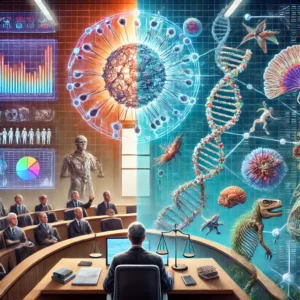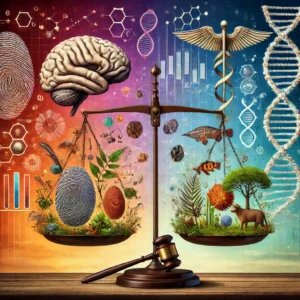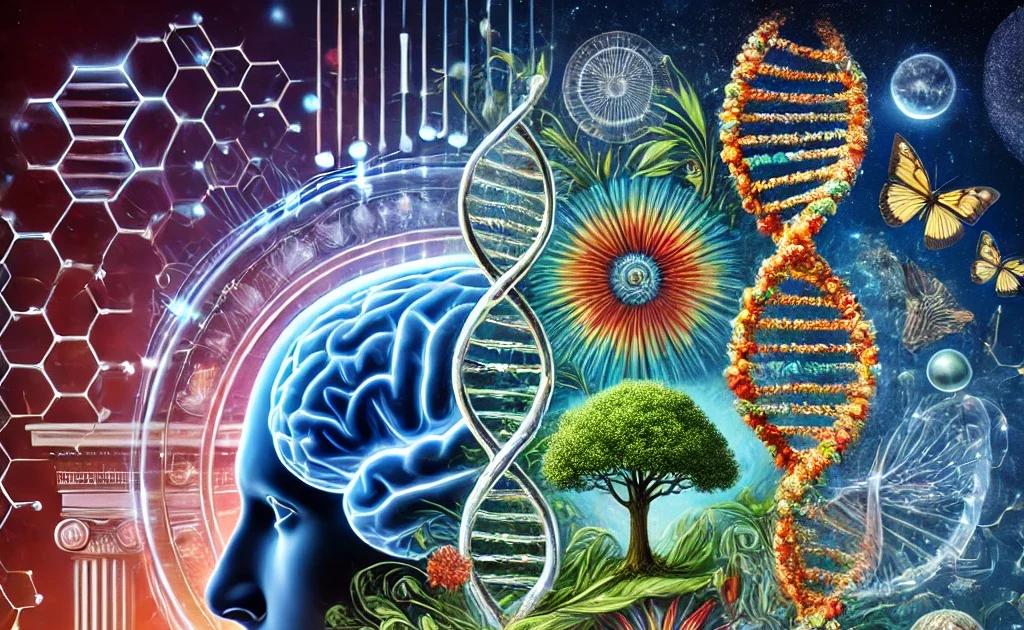Understanding Human Behavior Through Forensic Psychology and Evolutionary Biology
Forensic psychology and evolutionary biology, though distinct disciplines, provide profound insights into human behavior. It bridges psychological principles with the legal system, analyzing behavior within criminal and judicial contexts. Evolutionary biology, on the other hand, examines how evolutionary processes have shaped traits and behaviors over time. This article explores these two fields, uncovering their importance and surprising intersections, while emphasizing their practical applications and theoretical foundations.

Forensic Psychology: Exploring Its Role
Applies psychological knowledge within the legal and criminal justice system. It aims to understand human behavior to assist in legal proceedings, often addressing issues like criminal responsibility, witness reliability, and competency to stand trial. Forensic psychologists perform roles such as:
- Profiling criminal behavior: Analyzing crime data to identify likely offenders.
- Conducting competency evaluations: Determining if individuals can participate in legal proceedings.
- Offering expert testimony: Providing evidence-based insights in court.
- Supporting offender rehabilitation: Designing counseling and training programs to reduce recidivism.
Applications
- Criminal Investigations: By collaborating with law enforcement, forensic psychologists help understand criminal motives and predict potential actions through psychological evaluations and behavioral analysis. This work often includes in-depth studies of criminal patterns and trends, aiding in developing preventative strategies.
- Courtroom Support: Forensic psychologists contribute to jury selection and evaluate testimony reliability, ensuring justice by assessing mental health and cognitive factors. Their insights ensure fair representation and balanced decision-making in complex legal cases.
- Rehabilitation Programs: They help design initiatives for offenders that include therapy and skills training to facilitate reintegration into society. These programs are often tailored to address underlying psychological issues that contribute to criminal behavior, offering a holistic approach to reducing recidivism.
This research-driven approach improves legal outcomes and enhances our understanding of criminal behavior, making it an essential component of modern justice systems.
Evolutionary Biology: Unveiling the Foundations of Life

Evolutionary biology studies the processes driving the diversity and adaptation of organisms. It explores questions like how genetic mutations arise and the environmental factors shaping evolution. Charles Darwin’s theory of natural selection remains central, explaining how advantageous traits persist across generations. This foundational concept has paved the way for countless scientific advancements, making evolutionary biology a cornerstone of biological sciences.
Key Principles in Evolutionary Biology
- Natural Selection: Traits improving survival and reproduction become more common in populations over time. For example, camouflage helps prey species avoid predators, while other traits, such as speed or enhanced senses, offer survival advantages.
- Genetic Drift: This random change in allele frequencies can significantly impact small populations, leading to unique evolutionary paths. Understanding genetic drift has helped scientists uncover the mechanisms behind biodiversity and the evolution of isolated species.
- Speciation: Evolutionary processes lead to the emergence of new species, offering insights into biodiversity. Speciation highlights the adaptability of life forms and the intricate processes that sustain ecosystems.
Evolutionary biology’s applications extend to medicine, agriculture, and environmental conservation, addressing critical challenges across disciplines. Its focus on adaptation and survival has profound implications for understanding current global challenges.
What a Biology Intersect
While distinct and evolutionary biology overlap in their examination of behavior. Evolutionary principles often explain underlying motivations that forensic psychologist’s study, providing a deeper understanding of why individuals act the way they do.
Evolutionary Insights into Criminal Behavior
Some behaviors linked to criminality can be traced to evolutionary adaptations:
- Aggression: In ancestral environments, aggression secured resources and ensured survival. Although less necessary in modern contexts, remnants of these behaviors manifest in certain crimes. Forensic psychologists examine these tendencies to better understand violent offenders.
- Deception: Evolutionary advantages of deception include acquiring resources or evading threats. In contemporary settings, this trait is evident in fraudulent activities. By studying deception’s evolutionary origins, forensic psychologists can refine techniques for detecting lies and understanding criminal motives.
Understanding these behaviors through an evolutionary lens allows forensic psychologists to develop strategies for crime prevention and risk assessment, improving their ability to address modern criminal behavior effectively.
The Evolution of Altruism and Moral Development
Altruism, or selfless behavior, has evolutionary roots in kin selection and reciprocal altruism. These behaviors enhance group survival, shaping moral and ethical frameworks. Forensic psychologists can use this understanding to address societal issues related to ethics and cooperation.
By integrating evolutionary biology into their work, forensic psychologists gain a more comprehensive view of behavior, enabling them to tackle complex cases with greater accuracy and insight.
Societal Contributions
Enhancing Community Safety
It improves public safety by:
- Profiling individuals to predict criminal behavior. By identifying potential threats, forensic psychologists help law enforcement anticipate and prevent crimes before they occur.
- Advising law enforcement on intervention strategies. Forensic psychologists’ expertise ensures that intervention methods are both effective and ethical, fostering trust between communities and law enforcement agencies.
- Counseling crime victims to facilitate recovery and resilience. Support services provided by forensic psychologists play a vital role in helping victims overcome trauma, rebuild their lives, and contribute positively to their communities.
Strengthening Legal Systems
Forensic psychologists ensure fair trials by providing expert assessments on mental health, aiding in jury selection, and verifying the credibility of evidence. Their role enhances judicial processes and outcomes, fostering a legal environment rooted in fairness and accuracy.
Evolutionary Biology in Modern Challenges
Advancing Healthcare
Evolutionary biology informs medical advancements, such as developing vaccines and understanding genetic disorders. Research on pathogens’ evolution helps predict their adaptations, aiding in public health efforts. By understanding how diseases evolve, scientists can develop more effective treatments and preventative measures.
Promoting Environmental Conservation
The study of species’ adaptability underpins conservation strategies, ensuring biodiversity preservation and ecological balance. Restoration projects and sustainable practices draw heavily on evolutionary principles. These efforts are essential for maintaining the health of ecosystems in the face of climate change and habitat destruction.
Enhancing Agricultural Practices
Selective breeding and genetic modification are informed by evolutionary biology, enabling improved crop yields and pest resistance. These innovations address global food security concerns. By applying evolutionary principles, agricultural scientists can create sustainable farming practices that support growing populations.
Why These Disciplines Matter
Evolutionary biology together deepens our understanding of human behavior and societal issues. By applying insights from these fields, we can:
- Develop effective crime prevention methods. By understanding the psychological and evolutionary roots of behavior, forensic psychologists can create strategies to reduce criminal activity.
- Formulate policies that consider human tendencies. Policymakers can use these insights to design laws and regulations that align with human nature, promoting harmony and stability.
- Tackle pressing global challenges using evidence-based approaches. Evolutionary biology provides the tools to address issues such as climate change, disease management, and food security, while ensures that justice systems remain equitable and effective.
Conclusion
Evolutionary biology unravels the complexities of behavior and life. Their integration provides a robust framework for addressing societal needs, fostering justice, and advancing our collective knowledge. By studying these fields, we gain tools to navigate modern challenges and appreciate the intricate factors shaping humanity and the natural world. The synergy between these disciplines offers a powerful lens for understanding and improving the world we live in.
